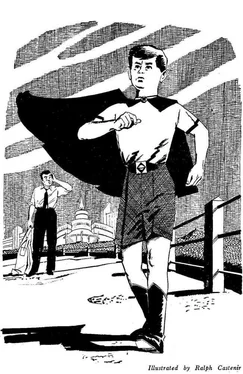Philip Dick - Progeny
Здесь есть возможность читать онлайн «Philip Dick - Progeny» весь текст электронной книги совершенно бесплатно (целиком полную версию без сокращений). В некоторых случаях можно слушать аудио, скачать через торрент в формате fb2 и присутствует краткое содержание. Жанр: Социально-психологическая фантастика, на английском языке. Описание произведения, (предисловие) а так же отзывы посетителей доступны на портале библиотеки ЛибКат.
- Название:Progeny
- Автор:
- Жанр:
- Год:неизвестен
- ISBN:нет данных
- Рейтинг книги:5 / 5. Голосов: 1
-
Избранное:Добавить в избранное
- Отзывы:
-
Ваша оценка:
- 100
- 1
- 2
- 3
- 4
- 5
Progeny: краткое содержание, описание и аннотация
Предлагаем к чтению аннотацию, описание, краткое содержание или предисловие (зависит от того, что написал сам автор книги «Progeny»). Если вы не нашли необходимую информацию о книге — напишите в комментариях, мы постараемся отыскать её.
Progeny — читать онлайн бесплатно полную книгу (весь текст) целиком
Ниже представлен текст книги, разбитый по страницам. Система сохранения места последней прочитанной страницы, позволяет с удобством читать онлайн бесплатно книгу «Progeny», без необходимости каждый раз заново искать на чём Вы остановились. Поставьте закладку, и сможете в любой момент перейти на страницу, на которой закончили чтение.
Интервал:
Закладка:
Parents could never become objective about their children. It was always a biased, emotional projection the parent held toward the child. Inevitably, the parent’s view was distorted. No parent could be a fit instructor for his child.
Robots could study the child, analyze his needs, his wants, test his abilities and interests. Robots would not try to force the child to fit a certain mold. The child would be trained along his own lines; wherever scientific study indicated his interest and need lay.
Ed came to the corner. Traffic whirred past him. He stepped absently forward.
A clang and crash. Bars dropped in front of him, stopping him. A robot safety control.
“Sir, be more careful!” the strident voice came, close by him.
“Sorry.” Ed stepped back. The control bars lifted. He waited for the lights to change. It was for Pete’s own good. Robots could train him right. Later on, when he was out of his growth stage, when he was not so pliant, so responsive—
“It’s better for him,” Ed murmured. He said it again, half aloud. Some people glanced at him and he colored. Of course it was better for him. No doubt about it.
Eighteen. He couldn’t be with his son until he was eighteen. Practically grown up.
The lights changed. Deep in thought, Ed crossed the street with the other pedestrians, keeping carefully inside the safety lane. It was best for Peter. But eighteen years was a long time.
“A hell of a long time,” Ed murmured, frowning. “Too damn long a time.”
DOCTOR 2g-Y Bish carefully studied the man standing in front of him. His relays and memory banks clicked, narrowing down the image identification, flashing a variety of comparison possibilities past the scanner.
“I recall you, sir,” Doctor Bish said at last. “You’re the man from Proxima. From the colonies. Doyle. Edward Doyle, Let’s see. It was some time ago. It must have been—”
“Nine years ago,” Ed Doyle said grimly. “Exactly nine years ago, practically to the day.”
Doctor Bish folded his hands. “Sit down, Mr. Doyle. What can I do for you? How is Mrs. Doyle? Very engaging wife, as I recall. We had a delightful conversation during her delivery. How—”
“Doctor Bish, do you know where my son is?”
Doctor Bish considered, tapping his fingers on the desk top, the polished mahogany surface. He closed his eyes slightly, gazing off into the distance. “Yes. Yes, I know where your son is, Mr. Doyle.”
Ed Doyle relaxed. “Fine.” He nodded, letting his breath out in relief.
“I know exactly where your son is. I placed him in the Los Angeles Biological Research Station about a year ago. He’s undergoing specialized training there. Your son, Mr. Doyle, has shown exceptional ability. He is, shall I say, one of the few, the very few we have found with real possibilities.”
“Can I see him?”
“See him? How do you mean?” Doyle controlled himself with an effort. “I think the term is clear.” Doctor Bish rubbed his chin. His photocell brain whirred, operating at maximum velocity. Switches routed power surges, building up loads and leaping gaps rapidly, as he contemplated the man before him. “You wish to view him? That’s one meaning of the term. Or do you wish to talk to him? Sometimes the term is used to cover a more direct contact. It’s a loose word.”
“I want to talk to him.”
“I see.” Bish slowly drew some forms from the dispenser on his desk. “There are a few routine papers that have to be filled out first, of course. Just how long did you want to speak to him?”
Ed Doyle gazed steadily into Doctor Bish’s bland face. “I want to talk to him several hours. Alone.” “Alone?”
“No robots around.”
Doctor Bish said nothing. He stroked the papers he held, creasing the edges with his nail. “Mr. Doyle,” he said carefully, “I wonder if you’re in a proper emotional state to visit your son. You have recently
come in from the colonies?”
“I left Proxima three weeks ago.” “Then you have just arrived here in Los Angeles?”
“That’s right.”
“And you’ve come to see your son? Or have you other business?” “I came for my son.”
“Mr. Doyle, Peter is at a very critical stage. He has just recently been transferred to the Biology Station for his higher training. Up to now his training has been general. What we call the non-dif- ferentiated stage. Recently he has entered a new period. Within the last six months Peter has begun advanced work along his specific line, that of organic chemistry. He wiU—”
“What does Peter think about it?”
Bish frowned. “I don’t understand, sir.”
“How does he feel? Is it what he wants?”
“Mr. Doyle, your son has the possibility of becoming one of the world’s finest bio-chemists. In all the time we have worked with human beings, in their training and development, we have never come across a more alert and integrated faculty for the assimilation of data, construction of theory, formulation of material, than that which your son possesses. All tests indicate he will rapidly rise to the top of his chosen field. He is still only a child, Mr. Doyle, but it is the children who must be trained.”
Doyle stood up. “Tell me where I can find him. I’ll talk to him for two hours and then the rest is up to him.”
“The rest?”
Doyle clamped his jaw shut. He
shoved his hands in his pockets. His face was flushed and set, grim with determination. In the nine years he had grown much heavier, more stocky and florid. His thinning hair had turned iron-gray. His clothes were dumpy and unpressed. He looked stubborn.
Doctor Bish sighed. “All right, Mr. Doyle. Here are the papers. The law allows you to observe your boy whenever you make proper application. Since he is out of his nondifferentiated stage, you may also speak to him for a period of ninety minutes.”
“Alone.”
“You can take him away from the Station grounds for that length of time.” Doctor Bish pushed the papers over to Doyle. “Fill these out, and I’ll have Peter brought here.”
He looked up steadily at the man standing before him.
“I hope you’ll remember that any emotional experience at this crucial stage may do much to inhibit his development. He has chosen his field, Mr. Doyle. He must be permitted to grow along his selected lines, unhindered by situational blocks. Peter has been in contact with our technical staff throughout his entire training period. He is not accustomed to contact with other human beings. So please be careful.”
Doyle said nothing. He grabbed up the papers and plucked out his fountain pen.
HE HARDLY recognized his son when the two robot attendants brought him out of the massive concrete Station building and deposited him a few yards from Ed’s parked surface car.
Ed pushed the door open. “Pete!” His heart was thumping heavily, painfully. He watched his son come toward the car, frowning in the bright sunlight. It was late afternoon, about four. A faint breeze blew across the parking lot, rustling a few papers and bits of debris.
Peter stood slim and straight. His eyes were large, deep brown, like Ed’s. His hair was light, almost blonde. More like Janet’s. He had Ed’s jaw, though, the firm line, clean and well-chiseled. Ed grinned at him. Nine years it had been. Nine years since the robot attendant had lifted the wire rack up from the conveyor pot, to show him the little wrinkled baby, red as a boiled lobster.
Peter had grown. He was not a baby any longer. He was a young boy, straight and proud, with firm features and wide, clear eyes.
“Pete,” Ed said. “How the hell are you?” •
The boy stopped by the door of the car. He gazed at Ed calmly. His eyes flickered, taking in the car, the robot driver, the heavy-set man in the rumpled tweed suit grinning nervously at him.
Читать дальшеИнтервал:
Закладка:
Похожие книги на «Progeny»
Представляем Вашему вниманию похожие книги на «Progeny» списком для выбора. Мы отобрали схожую по названию и смыслу литературу в надежде предоставить читателям больше вариантов отыскать новые, интересные, ещё непрочитанные произведения.
Обсуждение, отзывы о книге «Progeny» и просто собственные мнения читателей. Оставьте ваши комментарии, напишите, что Вы думаете о произведении, его смысле или главных героях. Укажите что конкретно понравилось, а что нет, и почему Вы так считаете.








